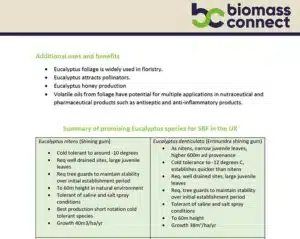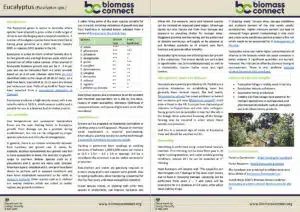Eucalyptus
Eucalyptus nitens, Eucalyptus gunnii, Eucalyptus urnigera, Eucalyptus dalrympleana, Eucalyptus glaucescens, Eucalyptus rodwayi, Eucalyptus globulus
General info
Eucalyptus is suited to short rotation forestry due to its fast growth rate and high biomass yield, which can exceed that of other native species. When planted in favourable locations, growth rate can be 2 – 3m per year and can be harvested from 4-6 years onward. Based on an 8-10 year rotation, data from UK trials identified yields in the range of 20-30 m3 ha/yr, on a bark-free basis, equivalent to 10-15 oven dry tonnes per hectare per year.
Eucalyptus produces a high-density wood, with a net calorific value of 18 GJ t, which seasons quickly and is suitable for use as a biomass fuel or timber product. Eucalyptus light canopy can afford options for growth in the understory. This means stands are well suited to agroforestry use (silvo-arable/pastural) as well as in shelterbelts, riparian buffer strips and sight screens.
Cultivation and agronomy
Planting is performed from seedlings at stocking densities of between 1,600-2,500 stems per hectare at 2.5 x 2.5m – 2.0 x 2.0 m spacing. 2-3 ha is considered the minimum area for viable commercial production. Tree shelters and stakes are generally required to protect young plants and support early growth. Due to rapid growth rates, close monitoring is essential for the first few years until trees successfully establish. Coppicing can be performed from years 2–7 and stools will be productive for 3-4 rotations of 4-8 years, after which stool viability drops.
Low temperatures and unseasonal temperature fluxes are the main limiting factor to Eucalyptus growth. Frost damage can be a problem during establishment, but risk can be mitigated by proper species selection and silvicultural management.
Few pests are currently prevalent in UK. Psyllids are a common infestation on establishing trees but generally have minimal impact. Eucalypts have displayed good resistance to Phytophthora and other foliar pathogens.
Return to crops overview
Relevant research
Purse, J. G., & Richardson, K. F. (2001). Short rotation single stem tree crops for energy in the UK-an examination with Eucalyptus. Aspects of applied biology, (65), 13-19.
Leslie, A., Mencuccini, M., Purse, J. G., & Perks, M. P. (2014). Results of a species trial of cold tolerant eucalypts in southwest England. Quarterly Journal of Forestry, 108(1), 18-18.
Leslie, A. D., Mencuccini, M., & Perks, M. P. (2018). Preliminary growth functions for Eucalyptus gunnii in the UK. Biomass and Bioenergy, 108, 464-469.
Leslie, A. D., Mencuccini, M., Perks, M. P., & Wilson, E. R. (2020). A review of the suitability of eucalypts for short rotation forestry for energy in the UK. New Forests, 51(1), 1-19.
Biomass Connect Trials
SRF Eucalyptus is currently being grown as part of the Biomass Connect trials at the following hub sites:
- AFBI Hillsborough
- BGI Chesham
- IBERS Aberystwyth
- NIAB Headley Hall
- Newcastle University Cockle Park Farm
- Rothamsted Research North Wyke
- SRUC Ayrshire
- SRUC Edinburgh
All of the sites above have the following 4 common species:
- Eucalyptus dalrympleana
- Eucalyptus gunnii
- Eucalyptus glaucescens
- Eucalyptus uringera
In addition, the more southerly sites at IBERS, BGI, North Wyke and AFBI in Northern Ireland also have:
- Eucalyptus nitens
The more northerly sites at SRUC Ayrshire, SRUC, Boghall, Cockle Park Farm and NIAB Headley Hall have:
- Eucalyptus denticulate (this is in place of Eucalyptus nitens which is not hardy enough for the northern sites)
Additional Resources from Biomass Connect

Read our Eucalyptus Technical Article

See our Eucalyptus Factsheet

Watch Bryan Elliott’s Biomass connect webinar: Eucalyptus as a short-rotation forestry crop for the UK

